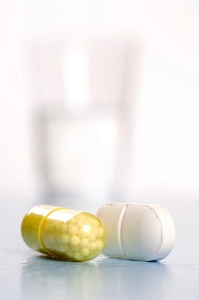
The placebo effect occurs when a person reports an improvement in symptoms after taking a medication that contains no ingredients that should cause symptom improvement. The effect requires that a person believes that the medication will work. For example, a person with depression who is given a sugar pill and is told that the medication is an antidepressant may report an improvement in theirdepression. A related effect, the nocebo effect, occurs when a person believes a substance will harm them and then reports negative symptoms.
Experiments Involving Placebos
In experiments testing medications, subjects are frequently divided into three groups:
- One group receives no treatment
- The second group receives the medication being tested
- The third group receives a placebo such as a sugar pill
Experimenters typically compare the results of the placebo group to the medication group to determine how much improvement is attributable to the medication versus simply to a belief that the medication will work. Many drugs turn out to be only slightly more effective than placebos.
Mechanism
The placebo effect is directly related to a person’s expectations. The more strongly a person believes in a medication’s efficacy, the more significant the effect of the medication is likely to be. Brain imaging tests indicate that the use of a placebo may activate portions of the brain related to information processing. Thus, people who take placebos may view their symptoms differently or may become more motivated to feel better.
The placebo effect has been scientifically proven to achieve the following:
Parkinson's disease: Placebo relief is associated with the release of dopamine in the brain.http://www.sciencemag.org/
Depression: Placebos intended to reduce depression affect many of the same areas that are activated by antidepressants with the addition of the prefrontal cortex. - http://
Caffeine: Placebo-caffeinated coffee causes an increase in bilateral dopamine release in the thalamus. http://
Glucose: The expectation of an intravenous injection of glucose increases the release of dopamine in the basal ganglia of men (but not women). - http://
Methylphenidate: The expectation of intravenous injection of this drug in inexperienced drug users increased the release of dopamine in the ventral cingulate gyrus and nucleus accumbens, with this effect being largest in those with no prior experience of the drug. -http://
In 1998, a meta-analysis of published antidepressant trials found that 75% of the effectiveness of anti-depressant medication is due to the placebo effect and other non-specific effects, rather than the treatment itself. -http://psycnet.apa.org/
"In the majority of trials conducted by drug companies in recent decades, sugar pills have done as well as -- or better than -- antidepressants. Companies have had to conduct numerous trials to get two that show a positive result, which is the Food and Drug Administration's minimum for approval. The makers of Prozac had to run five trials to obtain two that were positive, and the makers of Paxil and Zoloft had to run even more" http://
The placebo effect has also been proven to relieve headaches, allergies, fever, colds, acne, warts, nausea, diabetes, and multiple sclerosis. The power of our minds are amazing. Align yourself energetically with the result you wish to have, and you will dramatically increase your chances of achieving it.

